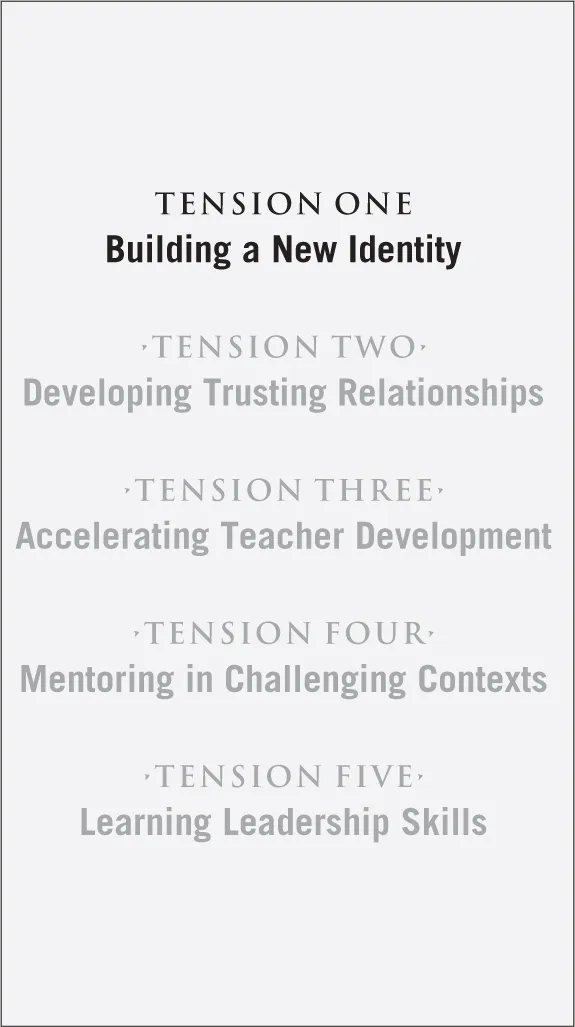![]()
Part One
The Tensions of Mentoring
![]()
Tension One
Building a New Identity
New mentors gather at their first training session excited and eager to learn more about their new role. They have agreed to step away from their comfortable past as successful, well-respected classroom teachers in a school with familiar faces and ways of working to take on new responsibilities supporting novice teachers in a variety of schools. Although excited about the opportunity, mentors, who are generally mid-career teachers, have only a cursory understanding of what their new role as full-time mentors really will entail.
Being selected as a mentor is public acknowledgment that one is an excellent teacher with the potential to support novice teachers. Practically overnight new mentors gain the status of being a teacher of teachers with high expectations that they have the skills necessary to transmit their knowledge and classroom expertise to novice teachers. By the end of their first school year, mentors share that the job of teacher mentor is much more complex and challenging than they had imagined and the transition to being an outsider in school(s) was more difficult than anticipated. Similar to teaching, they had been thrown into all the responsibilities that the work entails, and with time and experience they gained a deeper understanding of the complexity of the task. Mentors know they are giving up working with children to work with novice teachers, but they don't always realize how significant the changes are on a personal level as they work in a variety of school settings with a variety of adults in their new status as “mentor teacher.”
Jenny
David
The adjustment to their new role begins with each mentor's entry into a school or schools where their thirteen to twenty mentees work. Their identity of having a home base is lost unless they work in a school that has a large number of new teachers. Mentors enter as outsiders and draw on their social skills to introduce themselves and establish new relationships. Context really matters. At some schools, they are made to feel welcome by the principal and treated as part of the staff; in other schools, mentors find that feeling welcome or even having administrators and veteran teachers understand the value of their work cannot be taken for granted. Here are some examples of challenges mentors shared in connection with entry into their assigned schools:
Mentors see themselves first and foremost as a classroom teacher of children, and it takes time to transition to seeing themselves as a mentor or teacher of teachers.
Mary
Becky
John
By the end of the second year, mentors have worked with many more novice teachers, are more proficient at their job, and more comfortable in their role. Some remarked as follows:
Paul
Jenny
After mentors feel comfortable with their new identity as a “new teacher mentor,” they still run into many situations in which they wonder, “What's my role in this situation? How should I behave? What's my responsibility under these circumstances?” Mentors must make judgments regarding how to behave in a variety of unanticipated situations. The dilemmas and challenges they face represent the typical tensions of mentoring. Following are a few examples of the issues mentors confront. Some of the issues cross over with themes covered in other chapters and will be discussed in more detail later.
Working in new schools, mentoring new teachers, and participating in sustained mentor training help mentors shift their perspective from being a classroom teacher to that of an educator with a broader perspective. What several mentors described as gaining a “global” perspective has implications for their vision of good schools, good teaching, and how to help teachers improve their practice. Becoming a mentor expands the vision of midcareer teachers as to how they can contribute to improving schools and the teaching profession.
Melissa
The shift from having the perspective of a classroom teacher to that of an educator was transformational for many mentors and has implications for how they work with other educators and view the profession of teaching.
Nancy
Mentors are first and foremost experienced teachers, some of whom had taught in only one school prior to their being selected as a district mentor. Their experience as mentors broadens their understanding of teaching and learning in different school cultures. As principals and veteran teachers see the value of their support to new teachers, and mentors become more knowledgeable and comfortable in their role, mento...


